
OFFERING TYPE: Regulation CF
PRICE PER SHARE: $0.75
VALUATION: $8.3 million
MINIMUM: $100
This Fast-Moving California Startup Could Solve…
Drop Delivery is featured in The Startup Investor:
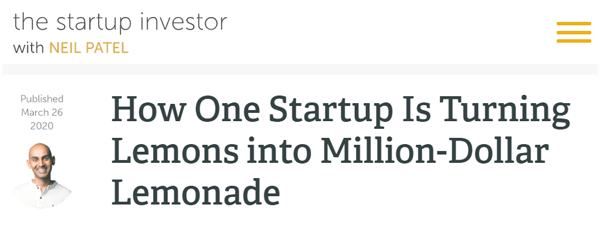
The “Big Idea”
In 60 Seconds
With an estimated $146.4 billion up for grabs, the global cannabis market has been one of the most talked about opportunities of the past 5 years.
However, for many cannabis investors, the so-called “Green Rush” hasn’t delivered the “life changing gains” many analysts have promised.
But thanks to this promising new technology startup, the major problem preventing the cannabis industry from achieving mass-market scale could be solved:
We’ve already seen “last mile” acquisitions by international brands with massive supply chains…
 In June of 2020, European company “Just Eat Takeaway” reached an agreement to acquire Grubhub for a whopping $7.3 billion.
In June of 2020, European company “Just Eat Takeaway” reached an agreement to acquire Grubhub for a whopping $7.3 billion.However, because of the current regulatory regime, cannabis retailers can’t take advantage of the existing “last mile solutions” to deliver a highly in-demand product directly to customers’ doors.
That’s why we call this unique challenge “The Last Green Mile.”
Billions of dollars have been poured into developing cannabis brands made for both the medical and recreational markets.
Massive retail footprints have been established by “multi-state operators.”
But as of today, there’s no scalable way to advertise, collect digital payments, and then deliver cannabis products directly to peoples’ doorstep.
That’s where Drop Delivery comes in.
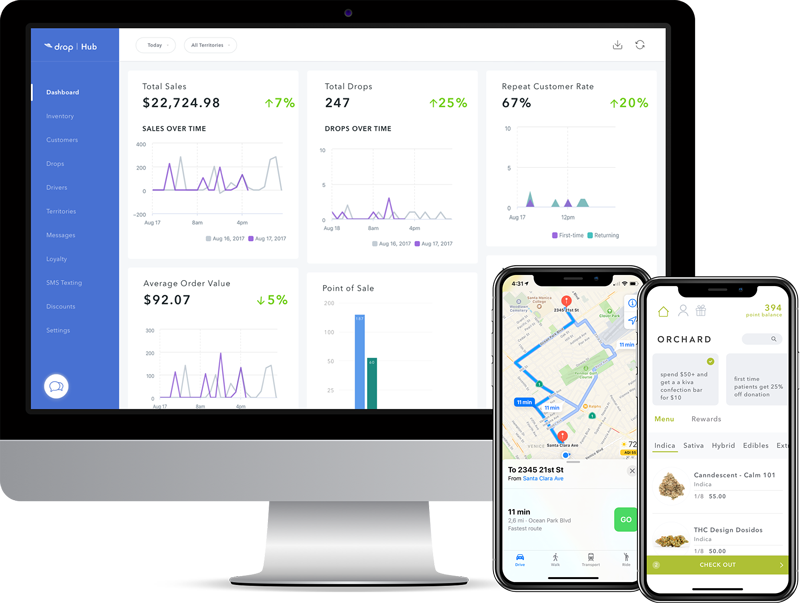
Drop Delivery’s Proprietary Platform
Drop is the first all-in-one platform designed to help cannabis retailers safely – and compliantly – sell cannabis products, collect digital payments, handle supply chain management, and last mile delivery.
Not to mention, it does it at an extremely affordable price compared to alternative options.
This means this unique software solution is designed to help cannabis retailers achieve higher profit margins under the existing regulatory regime — not under the hopes any meaningful laws will be passed.
Year to date, the Drop Delivery software platform is already being used by more than 96,000 retail customers, and has processed more than $6 million in transactions in 2020 across multiple states.
The company is seeing 30%+ growth month-over-month across major data points, which include clients, transactions, and marketing engagements.
And, the management team has a proven track record in the cannabis space, recently selling its cannabis order ahead platform for dispensaries – Greenlight – after only 9 months of operation.
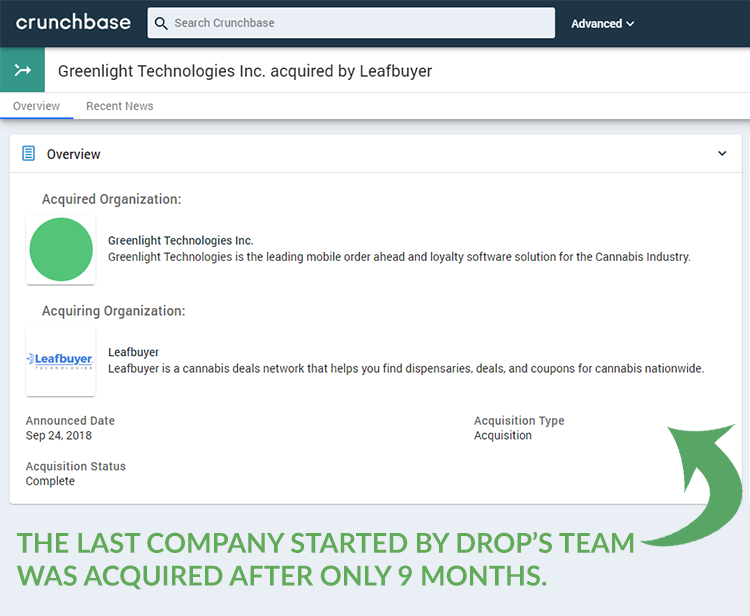
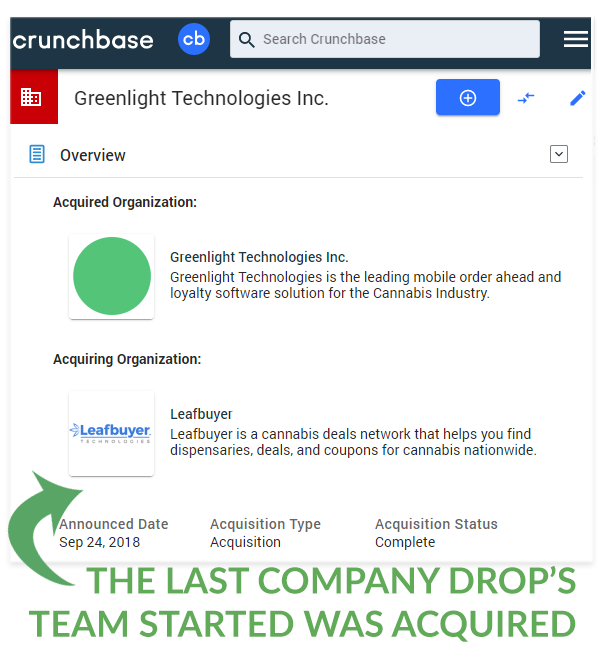
But perhaps the most important trend to consider is America’s rapid shift away from bricks-and-mortar retail locations to a “delivery-first” model.
Even before the COVID-19 crisis, we were already seeing consumers prove their willingness to pay a small premium to have items delivered directly to their door…
And with the recent development of Marijuana dispensaries being deemed as “essential” by the U.S. Government, not only has the legal cannabis industry posted record sales numbers in 2020…
Three states that previously did not allow delivery – Louisiana, Delaware, Utah, and Washington D.C. – now do as a response to COVID-19.
In Minnesota and Pennsylvania, while direct delivery isn’t currently allowed, caregivers are allowed to deliver cannabis to multiple patients.
And at the time of publishing, there are a total of 21 states – Arkansa, Arizona, California, Colorado, Connecticut, Delaware, Florida, Louisiana, Maine, Maryland, Massachusetts, Michigan, parts of Montana, Nevada, New York, North Dakota, Oregon, Texas, Utah, Vermont – that allow delivery of cannabis products.
The Top 5 Reasons To Consider Investing In Drop Delivery
Top 5 Reasons To Consider Investing In Drop Delivery
Vanessa Gabriel, CEO and co-founder of Drop, is also the founder of multiple startups. Most notably, her previous cannabis company, Greenlight, was acquired by a publicly traded cannabis company within 9 months of launching. The entire Greenlight management team is now working together to build Drop Delivery, with goals to take the company all the way to IPO.
International brands have already proven their willingness to buy companies who can streamline their supply chain and offer increased last mile delivery solutions. This means Drop Delivery could become a potential target for an acquisition by a large “Multi State Operator,” or otherwise receive outside investments for strategic partnerships.
While there are other technology solutions in the market today, many of them solve only a small portion of problems facing cannabis retailers today. Integrating these siloed solutions together creates potentially large compliance risks as well as added costs.
Drop Delivery is a complete, end-to-end platform that can handle sales and marketing, compliance, digital payments, banking issues, and last mile delivery, and does so at a competitive price. This means there is no data loss between multiple technology solutions, which in turn provides greater opportunities to leverage data and analytics tools to increase profits for cannabis retailers.
More importantly, the Drop Delivery platform is built on the same infrastructure high-growth tech companies like Uber, Alibaba, and Pinterest all currently use.
Year to date, Drop Delivery has over 96,000 retail customers ordering products through the Drop Delivery ecosystem. More than $6 million in transactions have been processed across multiple states. Cannabis retailers are using this software solution in multiple states, with more new clients coming online each month.
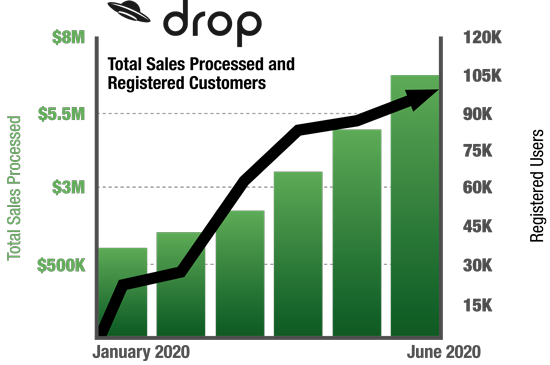
Because this platform is designed to operate in the most challenging of regulatory and compliance regimes, it’s logical to suggest other regulated businesses – like pharmacies and liquor stores – could be next to adopt this technology.

For years, promoters have pushed the legal cannabis market as a “once-in-a-lifetime chance to get rich.”
But for many investors who hoped to become a “pot stock millionaire“ by betting on speculative penny stocks, the so-called “Green Rush” has been a disappointment.
Like many hype-fueled bubbles, these high-flying stocks eventually need to turn their debt-driven growth into sustainable profits.
At the time of publishing, many of the publicly traded cannabis companies have plummeted in value…
But the fundamental argument for the legal cannabis opportunity remains solid.
Here’s why…
Growing Mainstream Support
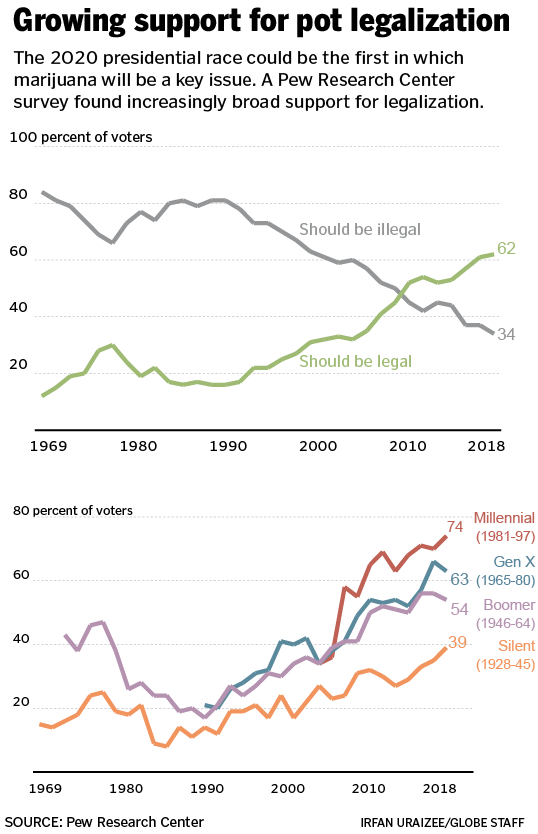
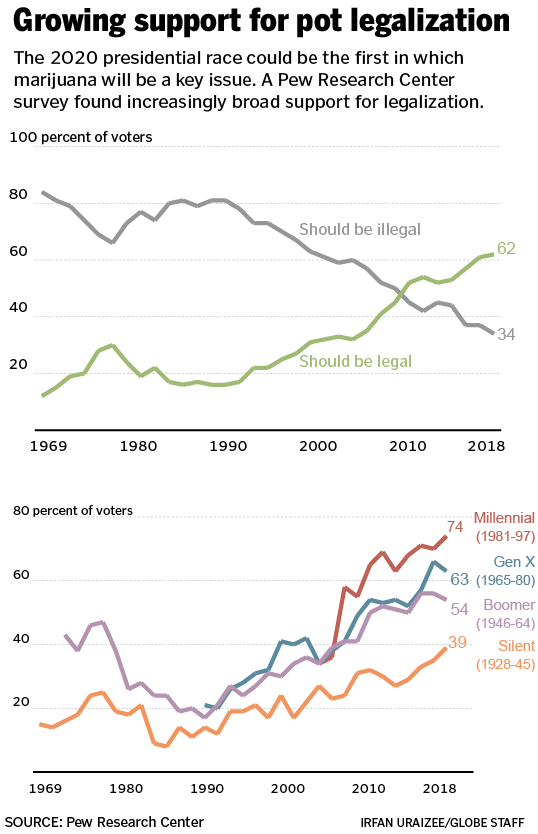
According to a study published by the National Center for Biotechnology Information: “The ageing US population is providing an unprecedented population of older adults who use recreational drugs.”
Among adults 65 and older, cannabis usage is up 250 percent from 2006 to 2013, while adults 50-65 have increased usage by almost 58 percent.
It should come as no surprise to see an increase in usage by people suffering from chronic pain, anxiety, loss of appetite or weight loss, depression, or sleeping disorder… all common conditions as people age.
Not to mention the ongoing studies regarding marijuana’s potential uses to treat patients suffering from Alzheimer’s disease, cancer, epilepsy, glaucoma, multiple sclerosis, and PTSD.
That’s why it’s also not surprising to see 62% of Americans say marijuana should be legal, reflecting a steady increase over the past decade, according to a new Pew Research Center study.
Increasing Political Support
It also comes as no surprise to see growing support from lawmakers in favor of passing more progressive laws.
We’ve even seen long-time marijuana detractors switch sides to support the legalization process
In 2012, U.S. Senator Elizabeth Warren was opposed to cannabis legalization. Today, she’s one of the legalization movements top cheerleaders on Capitol Hill.
Senate Minority Leader Charles E. Schumer (D-N.Y.) recently announced that he has decided to support decriminalizing marijuana at the federal level and will advocate bills to help marijuana businesses grow. Schumer cited an “evolved thinking — both personally and by the nation” for his switch.
And President Trump has stated he supports states’ rights to legalize.
And most notably, the U.S. Attorney General William Barr announced he will not go after marijuana companies operating in states where the plant is legal.
Job Creation
According to the New York Times, the cannabis industry has one of the fastest-growing rates of job creation.
But it’s not just net job creation that creates a compelling case. It’s the increasing demand for higher-skilled – and higher-paid – positions like chemists, software engineers, and nurses who consult with patients.
According to CNBC, Cannabis job’s also pay 11% more than the US median salary, meaning the cannabis industry has the potential to attract high-skilled workers from other industries to fuel its growth.
Schools are even gearing up to prepare students for jobs in the marijuana industry. Colleges in New York, Colorado, California, and Michigan now offer cannabis-specific courses.
As the cannabis industry matures, it’s likely there will be an increase in professional roles supporting the cannabis industry, such as tax, legal, and compliance issues.
However, the most bullish case for the cannabis market comes from the potential “cash cow” it represents for many state’s dwindling coffers.
Increased Tax Revenue
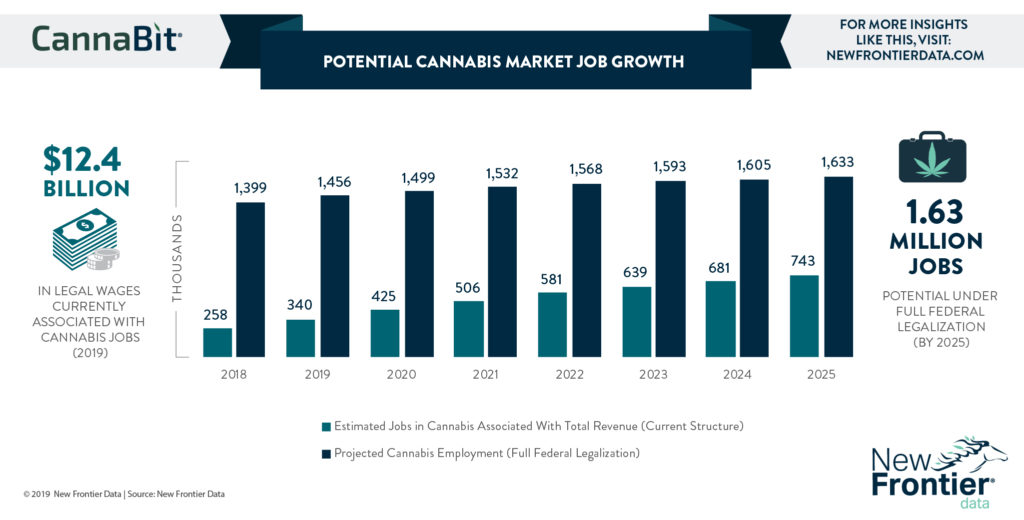 Given the current economic circumstances due to COVID-19, the case for legal marijuana becomes more likely for more states going forward.
Given the current economic circumstances due to COVID-19, the case for legal marijuana becomes more likely for more states going forward. Just look at the major revenues being generated at these states:
California
2019 Marijuana Tax Revenue: $629.3 million
Lifetime Marijuana Tax Revenue: $1.03 billion

Washington
2019 Marijuana Tax Revenue: $395.5 million
Lifetime Marijuana Tax Revenue: $1.33 billion

Colorado
2019 Marijuana Tax Revenue: $302.4 million
Lifetime Marijuana Tax Revenue: $1.21 billion

Oregon
2019 Marijuana Tax Revenue: $102.1 million
Lifetime Marijuana Tax Revenue: $275 million

Nevada
2019 Marijuana Tax Revenue: $99.2 million
Lifetime Marijuana Tax Revenue: $167 million


Massachusetts
2019 Marijuana Tax Revenue: $6.7 million
Lifetime Marijuana Tax Revenue: $6.7 million

Outside Investment Is Pouring In
That’s why it’s no surprise to see almost $20 billion in investment capital flood into the cannabis industry over the past three years alone.
In 2017, $1.85 billion in capital was raised.
In 2018, another $7.46 billion was raised.
And in 2019, $10.38 billion of capital was added to the global cannabis industry.
But even though the industry is awash with cash, there’s still one final piece of the puzzle that has yet to be solved…
The Last Green Mile
The first company who can create a reliable – and scalable – last mile distribution network could become the true “next big thing” investors have been searching for.
Here’s why…
In order for any business ecosystem to thrive, eventually, a retail customer needs to buy something.
Right now, there’s an enormous amount of supply…
There’s a growing volume of demand…
But there’s no easy – and scalable – way to get it into the hands of everyday people.
Even though the laws have come a long way in the past 20 years…
For most people, the only way to legally get cannabis is to go to a bricks-and-mortar location.
But it’s not like they can go down to their local pharmacy to get their prescription.
They have to go to a cannabis dispensary, which creates a huge problem.
The majority of cities in America – if cannabis is even legal – don’t want cannabis retailers in their towns.
 “Three out of four Americans support legalizing marijuana — but almost half of Americans don’t want dispensaries in their neighborhood, according to a study from Pew Research.”
“Three out of four Americans support legalizing marijuana — but almost half of Americans don’t want dispensaries in their neighborhood, according to a study from Pew Research.” This means millions of Americans are forced to travel long distances to pick up the medically prescribed cannabis they need.
But for people who need medical cannabis the most – like wounded veterans, cancer patients, and the elderly…
Driving long distances – or using public transportation – to get their prescription isn’t safe for them OR the general public…
Especially given the current challenges with COVID-19.
That’s why it’s increasingly important to develop alternative options – like delivery services – to increase accessibility for all types of patients, especially seniors.
For those who choose to use legal cannabis recreationally…
They, just like most people, would rather have the convenience they get from every other product category they currently buy online.
But with the current laws and regulatory regime, it’s impossible to use any of the currently available distribution channels
At the time of publishing, it’s currently illegal to send cannabis products containing THC using the US Postal Service. Major logistics companies, like FedEx and USPS, won’t ship it either…

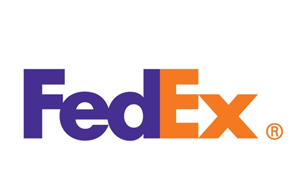
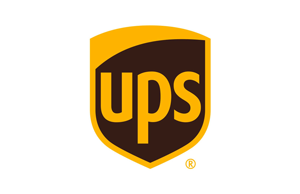
And it’s highly unlikely that any multi-billion-dollar company is going to invest the money into building a distribution network with so much legal risk and uncertainty.
That’s why this problem likely won’t be solved by e-commerce giants like Amazon…
It likely won’t be solved by cannabis darlings – like Canopy and Tilray – who are focused on dominating the supply side of the economic equation.
“Canopy Growth advances the world’s perception of cannabis by focusing on research, product development and innovative production capabilities – all presented through brands people trust.”
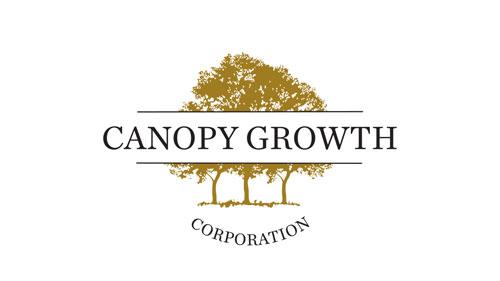
“Tilray is a global leader in cannabis research, cultivation, processing and distribution. We aspire to lead, legitimize and define the future of our industry by building the world’s most trusted cannabis and hemp company.”
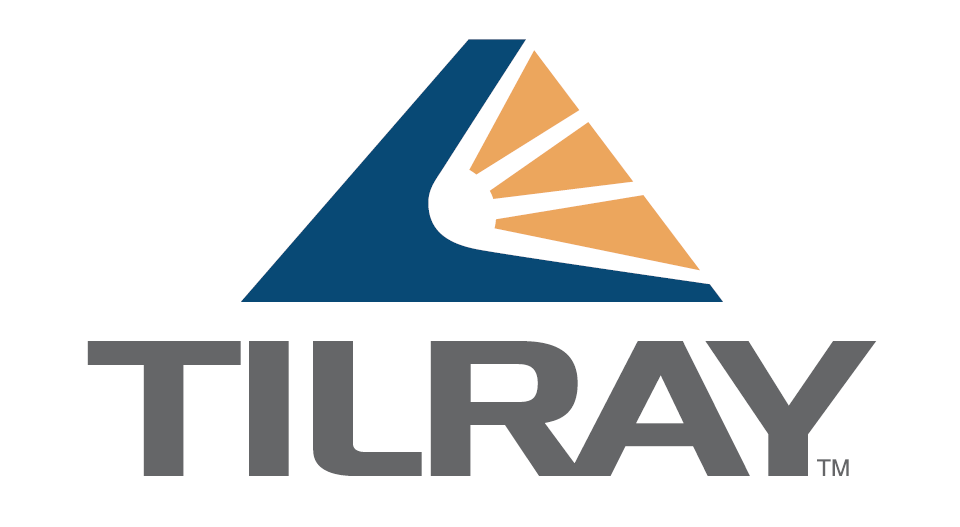
And due to the high barriers for “Big Marijuana” to emerge and dominate, the problem seems best solved by local, small business owners.
Vox Media’s “The Verge” keenly noted:
“One of the interesting effects of federal prohibition is that it prevents any interstate commerce from taking place. So anytime a state legalizes marijuana, it needs to produce marijuana in state, and that’s requiring them to, in essence, create local industries of marijuana producers. In a way, the federal prohibitions alongside state legalization are giving smaller-scale producers a leg up. Once you have prohibition, you’re going to have across-the-country procedures in many different states.”
That means solving the “Last Green Mile” problem could be the key to unlocking the $146 Billion “Green Rush” opportunity.
But to understand why…
It’s important to understand the massive challenges that prevent local cannabis business owners from operating safely – and profitably – in the current environment.
Five major challenges the current regulatory environment creates that must be overcome
Five challenges the current regulatory regime creates that must be overcome
Challenge #1: Compliance
Laws governing cannabis retailers vary from state to state, county to county, and city to city.
Most follow a similar set of guidelines; for example, they can’t be a certain distance from a school, daycare or another cannabis dispensary.
But because there’s no singular guidance across all jurisdictions, it creates a huge regulatory and compliance burden for small business owners. In fact, 40% of industry professionals said ensuring regulatory compliance was their single, major operational challenge.
This makes it increasingly difficult for cannabis business owners to operate profitably.
Which, in turn, makes it increasingly difficult for retail customers to get the products they want and need.
Challenge #2: Marketing and Advertising
Facebook and Google control the lion’s share of digital advertising inventory in the U.S. At the time of publishing, they don’t allow advertisements of any illegal substances, which includes cannabis. Given the large legal risks, they’re unlikely to change their policies until full federal legalization.
Without access to arguably the most powerful advertising platform available to small business owners, cannabis entrepreneurs are forced to navigate state-by-state advertising rules and regulations.
While there is some ability to legally advertise cannabis products, in practice, it presents a large amount of risk that both the advertiser and entrepreneur are often unwilling to accept.
This means the most practical option is to build a brick and mortar location in an easy-to-access place.
Like any retail business, opening a new location comes with high upfront costs. But for cannabis retailers, the costs can quickly become enormous…
Facebook and Google control the lion’s share of digital advertising inventory in the U.S. At the time of publishing, they don’t allow advertisements of any illegal substances, which includes cannabis. Given the large legal risks, they’re unlikely to change their policies until full federal legalization.
Without access to arguably the most powerful advertising platform available to small business owners, cannabis entrepreneurs are forced to navigate state-by-state advertising rules and regulations.
While there is some ability to legally advertise cannabis products, in practice, it presents a large amount of risk that both the advertiser and entrepreneur are often unwilling to accept.
This means the most practical option is to build a brick and mortar location in an easy-to-access place.
Like any retail business, opening a new location comes with high upfront costs. But for cannabis retailers, the costs can quickly become enormous…
a short list of costs a cannabis entrepreneur must budget for before opening its doors:
And these costs don’t cover the countless dollars and man-hours wasted on using multiple point-of-sale and customer management systems. The situation is so bad that b ig name retailers like Medmen and Puffy Delivery have spent fortunes building out their own custom platforms — far more than an average cannabis shop is able to afford.
Drop Delivery provides a turn-key, all-in-one solution covering point-of-sale, delivery, and customer management that is fully-branded to each client — and it does so at a fraction of the cost of other options.
In total, it’s estimated the cost of opening a cannabis dispensary ranges from $150,000 to up to $2 million.
That includes key costs of around $250,000 for annual staffing, $100,000 in yearly rent, and $50,000 for up-front renovations.
And that’s assuming an entrepreneur can even find commercial real estate to rent in the first place.
Even though three out of four Americans support legalizing marijuana, almost half of Americans don’t want dispensaries in their neighborhood, according to a study from Pew Research.
In California, roughly 80% of the state’s jurisdictions have said no to cannabis stores setting up shop for adult-use sales.
Even if they are willing to let a cannabis dispensary set up shop, it’s difficult to find landlords willing to rent to cannabis retailers.
To make things even more challenging, there’s still a stigma many people feel when going to retail locations.
According to a study conducted by the Journal of Psychoactive Drugs…

This creates an interesting challenge…
Consumers have proven they both want the product and are willing to pay for it a legal-market prices. But it’s difficult to imagine being a business owner in 2020 who cannot legally advertise their services or sell online.
And even though consumers have proven they want cannabis products, social stigma creates added friction when trying to attract customers into retail locations.
While it’s easy to assume these “legal drug dealers” must be making money hand over fist… growing a business solely on word of mouth marketing creates a severe disadvantage.
But that is only the beginning of the problem for cannabis business owners.
Because once they do get a potential customer in their location, now they face huge hurdles with making the sale…
Challenge #3: Digital Payments
It’s no secret that Americans love their credit cards. And like all modern conveniences, it’s tough to give up the benefits that come from digital transactions.
But if you’ve ever been to a dispensary, you already know you can’t use your Visa or Mastercard to buy marijuana.
This means the majority transactions have to be done in cash.
To put things into perspective, economists estimate that only 8 percent of the world’s currency exists in physical cash. The rest is all digital.
This means no industry can ever hope to expand without access to digital payment options.
As a result, it’s more expensive for the cannabis business owners…
“For our cannabis merchants that deal with high volumes of cash transactions, cash-handling costs can represent approximately 10-15% of total revenue generated.” – Dash, Digital Cash Provider
And because of the large amount of cash these businesses have on hand, there is a very real risk to both the business and its customers.
“Over the course of a month, we probably have $2 million in cash that’s in some state of transit,” says [one cannabis business owner]. “By the end of the year, that’s expected to top $4 million, which will mean more armored vans and heavily armed guards.” – National Public Radio
But to make things even more challenging…
Challenge #4: Banking
Imagine for a moment there’s an industry that has $15 billion in legal sales volume – which is the total revenue YouTube generated for Google in 2019 – where less than 30% of businesses have access to a bank account.
And of the institutions that will bank them, the deposit fees can be as high as 3%.
Can you imagine being a business owner who is forced to pay 3% of your cash collected… just to deposit it in a bank?
That’s the situation facing today’s legal cannabis marketplace.
It creates a cascading set of problems for business owners trying to run a profitable business.
The most obvious problem is getting access to capital and credit.
Right now, the legalities around money laundering are complex and have room for interpretation.
In practice, this means major banking institutions – like Chase, Wells Fargo, Citi Bank – won’t open any accounts for cannabis retailers due to the potential risk.
Imagine owning a business where you can’t take out any loans, get access to credit cards, or use any normally available financial products most small businesses have access to?
For example, a checking account.
Without access to a regular, everyday checking account, how would you pay for your normal operating expenses?
Most vendors – like utilities, internet, phones, or technology providers – don’t want to accept cash…
Can you imagine what a hassle it must be to run payroll, balance your books, and manage costs when you can’t use checks?
And another challenging part of not having a bank account?
Challenge #5: Taxes
Even though lawmakers see the enormous potential tax revenue the legal cannabis industry could deliver…
It’s no simple task to collect tax payments from “cash-heavy” businesses.
In 2017, the U.S government collected an estimated $4.7 billion in taxes from cannabis companies… in cash!
And the collection process is just as time consuming as you’d imagine.
Right now, when a cannabis business pays federal taxes, someone has to schedule an appointment with the IRS to go to its local offices and make a cash deposit. A secure space is set aside to count it all, and there are two IRS employees inside the room at all times.
“Bags of Cash and Stealthy Deliveries: How Pot Start-Ups Pay Taxes…
Imagine feeding $20,000 of cash through a machine, one $20 bill at a time,” said Ms. Gates of the tax payment process. “It can take two or three hours each time.” – The New York Times
For most people – and most businesses – taxes are their single, greatest expense.
Imagine running a small business where the government already imposes heavy tax burdens.
Now, imagine you can’t deduct what would otherwise be normal, ordinary, and legal expenses required to do business?
According to the Internal Revenue Code Section 280E, marijuana businesses are unable to deduct ordinary business expenses such as marketing, training, transportation.
When you add up all the added costs these cannabis entrepreneurs must endure…
 million to open a bricks-and-mortar location…
million to open a bricks-and-mortar location…For most people – and most businesses – taxes are their single, greatest expense.
Imagine running a small business where the government already imposes heavy tax burdens.
Now, imagine you can’t deduct what would otherwise be normal, ordinary, and legal expenses required to do business?
According to the Internal Revenue Code Section 280E, marijuana businesses are unable to deduct ordinary business expenses such as marketing, training, transportation.
When you add up all the added costs these cannabis entrepreneurs must endure…
What it creates is an effective federal tax rate of 60 to 90 percent.
To solve this problem, it’s not enough to fix the brick and mortar locations…
It’s not enough to fix the advertising laws…
And it’s not enough to fix the compliance burdens.
It’s important to note that people have been buying and selling marijuana far before it became decriminalized or legalized. The black-market drug trade has a long history and an international presence.
Consequently, any government attempting to generate revenue through legalizing drugs is essentially in direct competition.
What’s the most effective way of winning this competition?
It’s not by offering your product at a reduced cost by lowering taxes. In actuality, the best way to win this competition is by offering greater convenience for the customer.
In a world where consumers everywhere have been spoiled by same-day (or next-day) delivery, there’s no easy way to ship cannabis products directly to customers’ doorstep.
In fact, the only viable way to deliver products containing THC is to have a private individual transport it.
But it’s highly unlikely any major ride-sharing platform (like Uber of Lyft) will tackle this problem.
Cannabis delivery laws vary significantly among states.
For instance, in Massachusetts, cannabis delivery for recreational users is illegal even though retail sales are legal.
And states that have legalized cannabis have their own laws defining who is eligible to transport. For example, in Washington you need to have a retailer license and comply with the requirements outlined in the law.
But if this “last green mile” can be solved, it could hold the keys that unlocks the profit potential of the…
$146 Billion “Green Rush” And Transforms It Into A “Green Tsunami”.
Up until this point, the major gains we’ve seen in the cannabis space have come from conglomerates looking to dominate the “supply side”.
But even with billions of dollars in investment capital, the media-darling cannabis companies have failed to operate at a profit, and instead have relied on hype to capture debt and equity capital to finance growth.
And thanks to COVID-19, we’ve already begun to see these companies collapse in market value.
This year will see a few multi-state operators (MSOs) fold and sell off their component companies according to Lewis Goldberg, managing partner of KCSA Strategic Communications. Most of the MSOs have been run by financial operators Goldberg said, not operational experts, but “with the need to deliver results, that will change.”
Stock prices of large companies have taken major hits to their share prices…
In the current environment of already sagging cannabis stocks, combined with the likely recession, and the lack of easy-to-access capital…
There’s a good chance we’ll see many of these companies go out of business.
Shockingly, because of marijuana’s Schedule I status, businesses in the marijuana industry are not entitled to federal bankruptcy protection… even if they’re operating in states where pot is legal and are involved only tangentially with marijuana.
But if the “Last Green Mile” can be solved, not only can the brave cannabis entrepreneurs – who dared to dream of a better and brighter future – be saved…

The world’s first all-In-One delivery management solution for cannabis retailers
Drop Delivery, a Venice, California-based software startup, has developed a turnkey-simple solution for cannabis retailers.
The Drop Delivery platform is built on the same infrastructure other high-growth tech companies – like Twitter, Pinterest, Uber, and Alibaba – currently use.
And because it functions as a “full stack” tech solution for cannabis retailers… it means they don’t have to waste time, energy, and already-thin profits trying to integrate multiple solutions (or custom build their own).
At the click of a button, Drop can instantly create a custom app for its cannabis retailer clients. This means they can onboard new clients in mere hours, instead of days or weeks compared to other solutions.
Their unique platform has a proven history of increasing sales performance and profit margins for its cannabis retail clients.
Even better, the software suite was developed with all of five of the major challenges in mind – along with several other profit-boosting features – to provide a simple, cost-effective, and complete solution.
Here’s how it works…
Drop Delivery, a Venice, California-based software startup, has developed a turnkey-simple solution for cannabis retailers.
The Drop Delivery platform is built on the same infrastructure other high-growth tech companies – like Twitter, Pinterest, Uber, and Alibaba – currently use.
And because it functions as a “full stack” tech solution for cannabis retailers… it means they don’t have to waste time, energy, and already-thin profits trying to integrate multiple solutions (or custom build their own).
At the click of a button, Drop can instantly create a custom app for its cannabis retailer clients. This means they can onboard new clients in mere hours, instead of days or weeks compared to other solutions.

Their unique platform has a proven history of increasing sales performance and profit margins for its cannabis retail clients.
Even better, the software suite was developed with all of five of the major challenges in mind – along with several other profit-boosting features – to provide a simple, cost-effective, and complete solution.
Here’s how it works…
Solution:
Compliance
Drop Delivery is fully integrated with METRC, which is short for Marijuana Enforcement Tracking Reporting Compliance.
It’s designed to track – from seed to sale – and meet the strictest regulatory requirements in today’s legal landscape.
And according to METRC’s website they are “the regulatory cannabis system trusted in more states than any other” and is “the most successfully-deployed regulatory cannabis system in the world.”
This means dispensary owners can be assured they’re in compliance without having to worry about any added overhead.
Solution:
Marketing and Advertising
According to W. Edwards Deming’s, who is often cited as the father of the third wave of the industrial revolution…
“Profit in business comes from repeat customers.”
Statistics on the value of customer retention compiled by Small Business Trends found that…
But most dispensaries don’t have a robust customer relationship management system to help them get new customers and keep them coming back.
With Drop Delivery, every cannabis retailer that uses their platform gets a custom app their customers can put on their smartphones.
This custom app opens the doors to tremendous opportunities for the retailer…
It gives their customers the ability to place orders directly from their mobile device…
It enables a “rewards” and “loyalty” program customers can use to redeem discounts, promotional offers, and special bonuses…
It allows simple re-ordering options to make it easy for customers to do business with them…
And because the dispensary now owns their customer data (with their SMS information) they have a completely legal way to remarket to their existing customers.
PLUS! Drop puts all of the customer data in one easy-to-use database!
This means they’ll have all of their analytics and sales data in one place… Which in turn can provide a better understanding of how to increase sales, and increase profits.
Oh, and in case you’re wondering about payments, Drop has that covered too.
Solution:
Digital Payments
On April 16th, 2020, Drop Delivery announced their strategic partnership with Alt Thirty Six, a digital payment and compliance platform, to provide cashless digital payments for our dispensary and delivery customers.
Alt Thirty Six’s solutions enable retailers to offer fully compliant cashless digital payments for their customers similar to a ‘Venmo’ for Cannabis.
As an ACH originator, Alt Thirty Six facilitates electronic payments by allowing the customer to quickly and securely connect their bank account and initiate a bank transfer via the automated clearing house.
The partnership between Drop Delivery and Alt Thirty Six will allow cannabis retailers to continue to serve their customers while prioritizing each customer’s safety and that of their employees as well.
And thanks to this partnership, it also provides a unique solution to the banking issue plaguing cannabis business owners.
Solution:
Banking
If you’re wondering how Alt Thirty Six managed to convince banks to accept ACH transactions for cannabis purchases, they didn’t.
Instead, they sidestepped the banks all together and partnered with Dash… a blockchain based digital currency with lightning fast transaction speeds.
Dash gives you the freedom to move your money any way you want. Grab a coffee, split a check, or pay your phone bill. Dash moves money anywhere, to anyone, instantly, for less than a cent.
Even though it’s not technically a bank account, it does create a much-needed intermediary step that gives cannabis retailers increased safety and security.
And while the US government doesn’t accept Dash for the purposes of tax payments, it does have the potential to make remitting taxes far easier and less time consuming for all parties involved.
But the most important problem Drop solves?
Solution:
The Last Green Mile
The most significant piece of Drop Delivery’s software is its ability to manage logistics and delivery.
With this all-in-one solution, cannabis retailers can…

Drop Delivery was designed to help cannabis businesses become more profitable under the legal and regulatory regime of today…
NOT the speculation of widespread legalization tomorrow.
Which means the technology is a viable solution RIGHT NOW for cannabis business owners who want to make more money today.
Even better, because of the enhanced delivery capabilities offered by the Drop Delivery platform, cannabis retailers can further offset their bricks-and-mortar costs with expanded service capabilities…
Or even forgo a retail location all together!
That’s why we’re excited to give you the opportunity to invest in this potentially breakthrough technology.
And their current customers love working with the Drop team…
After using the Drop platform, clients have seen their sales increase 136% and average order values increase 115%.
 Our experience working with DROP has been awesome.
Our experience working with DROP has been awesome. -LaTanya Hicks
Owner, Green On The Go
 DROP MAKES IT EASY…
DROP MAKES IT EASY…
-Elaine Lu
Owner, Ashe Society
Even better, because of the enhanced delivery capabilities offered by the Drop Delivery platform, cannabis retailers can further offset their bricks-and-mortar costs with expanded service capabilities…
Or even forgo a retail location all together!
That’s why we’re excited to give you the opportunity to invest in this potentially breakthrough technology.
Founders With A Proven Track Record of Success
Drop’s award-winning product team’s experience spans across multiple industries including social streaming, mobile commerce, cosmetics, fashion, and cannabis.
The team entered the cannabis market in 2019 with Greenlight, the first native order ahead mobile app for dispensary customers. It quickly went viral with thousands of users and tens of millions in sales processed through the platform. Nine months after launching, Greenlight was acquired by a publicly traded cannabis company.

Vanessa Gabriel, CEO
Founder of multiple startups and recently exited in the cannabis industry with Greenlight, the first mobile order ahead app within 9 months of launching.

Marc Lopez, CTO
Web developer with over 8 years of experience in established and rapidly growing industries with a focus in mobile development and data analytics.

Jade Gabriel, CPO
Award winning UI/UX designer that has led product teams for social streaming, fashion, mobile commerce, and cannabis. Her products have grossed over $65 million in sales transactions.

Quincy Taylor, Director of Sales
5+ years of experience in the cannabis industry from managing retail locations, selling software, and overseeing client accounts.
Investment Documents, Risks & Disclosures
RISK FACTORS
A crowdfunding investment involves risk. You should not invest any funds in this offering unless you can afford to lose your entire investment.
In making an investment decision, investors must rely on their own examination of the issuer and the terms of the offering, including the merits and risks involved. These securities have not been recommended or approved by any federal or state securities commission or regulatory authority. Furthermore, these authorities have not passed upon the accuracy or adequacy of this document.
The SEC does not pass upon the merits of any securities offered or the terms of the offering, nor does it pass upon the accuracy or completeness of any offering document or literature.
These securities are offered under an exemption from registration; however, the SEC has not made an independent determination that these securities are exempt from registration.
An investment in the Company involves a high degree of risk. You should carefully consider the risks described above and those below before deciding to purchase any Shares in this Offering. If any of these risks actually occurs, our business, financial condition or results of operations may suffer. As a result, you could lose part or all of your investment.
Risks Related to the Company’s Business and Industry
We have a limited operating history upon which you can evaluate our performance, and accordingly, our prospects must be considered in light of the risks that any new company encounters.
We were incorporated under the laws of the State of California on June 14, 2019. We have limited operations and nominal operating revenue to date. We are in the development stage, and our future operations are subject to all of the risks inherent in the establishment of a new business enterprise. The likelihood of the success of our company must be considered in light of the problems, expenses, difficulties, complications and delays frequently encountered in connection with the development of an entity in the business of operating a software and logistics company. There can be no assurance that we will be able to generate revenue, that future revenue will be significant, that any sales will be profitable or that we will have sufficient funds available to complete our marketing and development programs or to market any new products which we may develop. We currently have operating losses, have no substantive source of operating revenue, are unable to self-finance operations, have limited resources, and there can be no assurance that we will be able to develop such revenue sources or that our operations will become profitable, even if we are able to commercialize our products and build brand awareness.
We have incurred operating losses in every quarter since we launched our business and may continue to incur quarterly operating losses, which could negatively affect the value of our company.
We have incurred operating losses of $ (7,555) since we founded our business in 2019, and we may not be able to generate sufficient revenue in the future to generate operating income. We also expect our costs to increase materially in future periods, which could negatively affect our future operating results. We expect to continue to expend substantial financial and other resources on the continued development of our software solutions. The amount and timing of these costs are subject to numerous variables and such initiatives may require additional funding. If we fail to continue to grow the overall business and begin to generate substantive revenue, it could adversely affect our financial condition and results of operations.
We face significant competition for our software and delivery applications.
The industry within which we operate, especially the cannabis industry, is highly competitive and we compete with a number of other companies that provide similar services to the cannabis industry. Our ability to compete successfully in the case of our software and delivery applications and to manage our planned growth will depend primarily upon the following factors:
Many of our competitors have greater financial, technical, product development, marketing and other resources than we do. These organizations may be better known than we are and may have more customers or users than we do. Our competitors include Indica Online, Baker, WebJoint, Meadow, Onfleet and other companies we may be unaware of. We cannot provide assurance that we will be able to compete successfully against these organizations, which may lead to lower customer satisfaction, decreased demand for our solutions, loss of market share and reduction of operating profits.
The forecasts of market growth included in our business plan and investor presentations may prove to be inaccurate, and even if the markets in which we compete achieve the forecasted growth, we cannot assure you our business will grow at similar rates, if at all.
Growth forecasts are subject to significant uncertainty and are based on assumptions and estimates that may not prove to be accurate. The forecasts in our business plan and investor presentations may prove to be inaccurate. Even if these markets experience the forecasted growth described in our business plan, we may not grow our business at similar rates, or at all. Our growth is subject to many factors, including our success in implementing our business strategy, which is subject to many risks and uncertainties. Accordingly, the forecasts of market growth included in our business plan should not be taken as indicative of our future growth.
In order for the Company to compete and grow, it must attract, recruit, retain and develop the necessary personnel who have the needed experience.
Recruiting and retaining highly qualified personnel is critical to our success. These demands may require us to hire additional personnel and will require our existing management personnel to develop additional expertise. We face intense competition for personnel. The failure to attract and retain personnel or to develop such expertise could delay or halt the development and commercialization of our product candidates. If we experience difficulties in hiring and retaining personnel in key positions, we could suffer from delays in product development, loss of customers and sales and diversion of management resources, which could adversely affect operating results. Our consultants and advisors may be employed by third parties and may have commitments under consulting or advisory contracts with third parties that may limit their availability to us.
Our business is subject to a variety of U.S. and international laws, rules, policies and other obligations regarding data protection.
We are subject to federal, state and international laws relating to the collection, use, retention, security and transfer of personally identifiable information. In many cases, these laws apply not only to third-party transactions, but also to transfers of information between us and other parties with which we may develop commercial relations. Several jurisdictions have passed recent laws in this area, and other jurisdictions are considering imposing additional restrictions. These laws continue to develop and may be inconsistent from jurisdiction to jurisdiction. Complying with emerging and changing international requirements may cause us to incur substantial costs or require us to change our business practices. Noncompliance could result in penalties or significant legal liability. More specifically, the marketing and sale of cannabis and cannabis related products is federally illegal. There is no guarantee that the federal government won’t enforce the federal prohibitions which would significantly adversely affect our business and our business prospects and could lead to additional costs related to enforcement actions. We do not believe, however, that the federal government intends to enforce the federal laws related to cannabis.
Our privacy policies and practices concerning the use and disclosure of data will be posted on our website. Any failure by us or other parties with whom we do business to comply with our posted privacy policies or with other federal, state or international privacy-related or data protection laws and regulations could result in proceedings against us by governmental entities or others, which could have a material adverse effect on our business, results of operations and financial condition.
Our company may not be able to effectively manage its growth or improve its operational, financial, and management information systems, which could have a material adverse effect on our business, results of operations, and financial condition.
In the near term, our company intends to expand the scope of its operations activities significantly. If our company is successful in executing its business plan, it will experience growth in its business that could place a significant strain on its business operations, finances, management and other resources. The factors that may place strain on its resources include, but are not limited to, the following:
Additionally, the strategy of our company could produce a period of rapid growth that may impose a significant burden on its administrative and operational resources. Its ability to effectively manage growth will require our company to substantially expand the capabilities of its administrative and operational resources and to attract, train, manage, and retain qualified management and other personnel. There can be no assurance that our company will be successful in recruiting and retaining new employees, or retaining existing employees.
Our company cannot provide assurances that its management will be able to manage this growth effectively. Its failure to successfully manage growth could result in its sales not increasing commensurately with capital investments or could otherwise have a material adverse effect on the business, results of operations, and financial condition of our company.
Assertions by third parties of infringement, misappropriation or other violation by us of their intellectual property rights could result in significant costs and substantially harm our business and operating results.
In recent years, there has been significant litigation involving intellectual property rights in many technology-based industries. Any infringement, misappropriation or related claims, whether or not meritorious, is time-consuming, diverts technical and management personnel and is costly to resolve. As a result of any such dispute, we may have to develop non-infringing technology, pay damages, enter into royalty or licensing agreements, cease providing our products or take other actions to resolve the claims. These actions, if required, may be costly or unavailable on terms acceptable to us. Any of these events could result in increases in operating expenses, limit our product offerings or result in a loss of business.
We may not be able to protect our intellectual property rights.
We currently do not have any trademarks, service marks, copyrights, patents, trade secrets, proprietary technologies, domain names and similar intellectual property. In the future we may rely on trademark, copyright and patent law, trade secret protection and confidentiality agreements with our employees, vendors, customers and others to protect our proprietary rights. We have sought and are working to possibly obtain patent protection for our delivery technologies. Many of the trademarks that we use contain words or terms having a somewhat common usage and, as a result, we may have difficulty registering them in certain jurisdictions. We have not yet obtained registrations for our any important marks. If other companies have registered or have been using in commerce similar trademarks for products similar to ours, we may have difficulty in registering, or enforcing an exclusive right to use, our marks.
There can be no assurance that our efforts to protect our proprietary rights will be sufficient or effective, that any pending or future patent and trademark applications will lead to issued patents and registered trademarks in all instances, that others will not develop or patent similar or superior technologies, products, or that our patents, trademarks and other intellectual property will not be challenged, invalidated, misappropriated or infringed by others. Additionally, the intellectual property laws and enforcement practices of other countries in which our product is or may in the future be offered may not protect our products and intellectual property rights to the same extent as the laws of the United States. If we are unable to protect our intellectual property from unauthorized use, our brand image may be harmed and our business and results of operations may suffer.
We will need additional financing to execute our business plan, which we may not be able to secure on acceptable terms, or at all.
We will require additional financing in the near and long term to fully execute our business plan. Our success depends on our ability to raise such additional financing on reasonable terms and on a timely basis. Conditions in the economy and the financial markets may make it more difficult for us to obtain necessary additional capital or financing on acceptable terms, or at all. If we cannot secure sufficient additional financing, we may be forced to forego strategic opportunities or delay, scale back or eliminate further development of our goals and objectives, operations and investments or employ internal cost savings measures.
We plan to implement new lines of business or offer new products and services within existing lines of business.
There are substantial risks and uncertainties associated with our efforts to implement new lines of business or offer new products and services within existing lines of business, particularly in instances where the markets are not fully developed. In developing and marketing new lines of business and/or new products and services, we may invest significant time and resources. Initial timetables for the introduction and development of new lines of business and/or new products or services may not be achieved, and price and profitability targets may not prove feasible. We may not be successful in introducing new products and services in response to industry trends or developments in technology, or those new products may not achieve market acceptance. As a result, we could lose business, be forced to price products and services on less advantageous terms to retain or attract clients, or be subject to cost increases. As a result, our business, financial condition or results of operations may be adversely affected.
Security breaches and improper access to or disclosure of our data or user data, or other hacking and phishing attacks on our systems, could harm our reputation and adversely affect our business.
Many industries are prone to cyber-attacks, including ours, with third parties seeking unauthorized access to our data or users’ data. Any failure to prevent or mitigate security breaches and improper access to or disclosure of our data or user data could result in the loss or misuse of such data, which could harm our business and reputation and diminish our competitive position. In addition, computer malware, viruses, and hacking and phishing attacks by third parties have become more prevalent in many industries and may occur on our systems in the future. Such attacks may cause interruptions to the products we provide, degrade our customers’ experience, cause customers to lose confidence in our products, or result in financial harm to us. Our efforts to protect our company data or the information we receive may also be unsuccessful due to software bugs or other technical malfunctions, employee error or malfeasance, government surveillance, or other factors. In addition, third parties may attempt to fraudulently induce employees or users to disclose information in order to gain access to our data or our customers’ data. Although we have developed systems and processes that are designed to protect our data and customer data and to prevent data loss and other security breaches, we cannot assure you that such measures will provide absolute security.
A failure to protect the integrity and security of our customers’ information could expose us to litigation, materially damage our reputation and harm our business. Furthermore, the unanticipated costs of protecting against such a failure could adversely affect our results of operations.
Our business involves the collection and use of confidential information of our customers and vendors. We cannot assure you that our efforts to protect this confidential information will be successful. If any compromise of this information security were to occur, we could be subject to legal claims and government action, experience an adverse effect on our reputation and need to incur significant additional costs to protect against similar information security breaches in the future, each of which could adversely affect our financial condition, results of operations and growth prospects. In addition, because of the critical nature of data security, any perceived breach of our security measures could cause existing or potential customers not to order our products and could harm our reputation.
The Company’s success depends on the experience and skill of the Board of Directors, the management team, its executive officers and key employees.
In particular, the Company is dependent on Vanessa Gabriel and Marc Lopez to execute the business strategy and business plan, and to manage any employees and consultants. As the Company grows, a corporate body of knowledge will be produced and taught to other employees in order to facilitate growth. As this happens, any change in management’s ability to operate the business due to disability, illness, or for any other reason, would cause a significant loss in production capability, which would have a material adverse effect on the Company’s business and prospects.
The Company has or intends to enter into employment agreements with Vanessa Gabriel and Marc Lopez although there can be no assurance that it will do so or that they will continue to be employed by the Company for a particular period of time. The loss any of the key employees could harm the Company’s business, financial condition, cash flow and results of operations.
Although dependent on certain key personnel, we do not have any key man life insurance policies on any such people.
We are dependent on Vanessa Gabriel and Marc Lopez in order to conduct our operations and execute our business plan, however, we have not purchased any insurance policies with respect to those individuals in the event of their death or disability. Therefore, if either of them were to die or become disabled, we will not receive any compensation to assist with such person’s absence. The loss of either such person could negatively affect our company and its operations.
We face risks related to the cannabis industry.
As a company focused on the cannabis industry, our company faces all of the risks that are unique to operating in this emerging industry. Federal law prohibits the use of cannabis, and our business is dependent on the growth of the cannabis industry. If the current, or a future, federal administration adopts policies promoting the stricter enforcement of federal law, our business would be materially adversely affected. In addition, the cannabis industry is extremely speculative. Although a number of states have decriminalized cannabis to varying degrees and other states have created exemptions specifically for medical cannabis, it remains fully illegal in 18 states (as of January 2019). Additionally, in most states the cultivation of cannabis for personal use continues to be prohibited. Active enforcement of these state laws could have a material adverse effect on our business, operations and prospects. In addition, although we do not cultivate, dispense or sell cannabis or any derivatives of the cannabis plant, it is possible that we may be accused by federal or state agencies of violating certain laws or regulations that involve cannabis as a result of the promotion through our media platforms of those companies that do cultivate, dispense or sell cannabis. An adverse finding could have a material adverse impact on our business, operations and prospects.
Our ability to grow our business depends on state and federal laws pertaining to the cannabis industry.
Continued development of the medical-use cannabis industry depends upon continued legislative authorization of cannabis at the state level. The status quo of, or progress in, the regulated medical-use cannabis industry is not assured and any number of factors could slow or halt further progress in this area. While there may be ample public support for legislative action permitting the manufacture and use of cannabis, numerous factors impact the legislative process. For example, states that voted to legalize medical and/or adult-use cannabis in the November 2016 election cycle have seen significant delays in the drafting and implementation of regulations related to the industry. In addition, burdensome regulation at the state level could slow or stop further development of the medical-use cannabis industry, such as limiting the medical conditions for which medical cannabis can be recommended by physicians for treatment, restricting the form in which medical cannabis can be consumed, imposing significant registration requirements on physicians and patients or imposing significant taxes on the growth, processing and/or retail sales of cannabis, which could have the impact of dampening growth of the cannabis industry and making it difficult for cannabis businesses to operate profitably in those states.
FDA regulation of medical-use cannabis and the possible registration of facilities where medical-use cannabis is grown could negatively affect the medical-use cannabis industry and our financial condition.
Should the federal government legalize cannabis for medical-use, it is possible that the U.S. Food and Drug Administration, or the FDA, would seek to regulate it under the Food, Drug and Cosmetics Act of 1938. Additionally, the FDA may issue rules and regulations including certified good manufacturing practices, or cGMPs, related to the growth, cultivation, harvesting and processing of medical cannabis. Clinical trials may be needed to verify efficacy and safety. It is also possible that the FDA would require that facilities where medical-use cannabis is grown register with the FDA and comply with certain federally prescribed regulations. In the event that some or all of these regulations are imposed, we do not know what the impact would be on the medical-use cannabis industry, including what costs, requirements and possible prohibitions may be enforced. If manufacturers and distributers are unable to comply with the regulations or registration as prescribed by the FDA, this could negatively impact our financial condition.
The SEC is monitoring the cannabis industry and may halt or prevent the Offering or sale of our securities due to the bad acts of others.
On May 16, 2014, the SEC’s Office of Investor Education and Advocacy issued an Investor Alert to warn investors about potential risks involving investments in marijuana-related companies. The SEC noted an increase in the number of investor complaints regarding marijuana-related investments. The SEC issued temporary trading suspensions for the common stock of five different marijuana-related companies. Due to the stigma created by the bad acts of others in the industry, the SEC may halt trading and offerings in all marijuana-related companies which would have a material adverse effect on our ability to raise capital and our business. Although we don’t consider ourselves a “cannabis company,” as we don’t “touch the plant” and merely provide ancillary services to the cannabis industry, our anticipated customers and user base are more directly involved with the marketing and sale of cannabis and any further adverse enforcement by the SEC could negatively affect our ability to raise money and operate.
We operate in a turbulent market populated by businesses that are highly volatile.
The US market for cannabis products is highly volatile. While we believe that it is an exciting and growing market, many companies involved in cannabis products and services used to be involved in illegal activities, some still are, and many of them operate in unconventional ways. Some of these differences which represent challenges to us include not keeping appropriate financial records, inexperience with business contracts, not having access to customary business banking relationships, not having quality manufacturing relationships, and not having customary distribution arrangements. Any one of these challenges, if not managed well, could materially adversely impact our business.
Many cannabis activities, products, and services still violate law.
The legal patchwork to which cannabis companies are subject is still evolving and frequently uncertain. While we believe that anti-cannabis laws are softening and that the trend is toward legalization of cannabis products, many states and the US government still view some or all cannabis activity as illegal. Notwithstanding this uncertainty we intend to do our best to engage in activities that are unambiguously legal and to use what influence we have with our affiliates for them to do the same. But we will not always have control over those companies with whom we do business and there is a risk that we could suffer a substantial and material loss due to routine legal prosecution. Similarly, many jurisdictions have adopted so-called “zero tolerance” drug laws. If our, or our affiliates’ activities related to cannabis activities, products, and services are deemed to violate one or more federal or state laws, we may be subject to civil and criminal penalties, including fines, for aiding and abetting those activities through the provision of our software products.
Reductions in marketing sales or sales of our services will have an adverse effect on our profitability and ability to generate cash to fund our business plan.
The following factors, among others, could affect continued market acceptance and profitability of our future products:
Adverse developments with respect sales of cannabis would indirectly reduce our user base and profitability and have a material adverse effect on our ability to maintain profitability and achieve our business plan.
We plan to obtain insurance that may not provide adequate levels of coverage against claims.
We plan to obtain insurance customary for businesses of our size and type. However, there are types of losses we may incur that cannot be insured against or that we believe are not economically reasonable to insure. Such losses could have a material adverse effect on our business and results of operations.
Establishing, maintaining, extending and expanding our reputation and brand image are essential to our business success.
We plan to establish, maintain, extend, and expand our brand image through marketing investments, including advertising and consumer promotions. Increasing attention on marketing could adversely affect our brand image. It could also lead to stricter regulations and greater scrutiny of marketing practices. Existing or increased legal or regulatory restrictions on our advertising, consumer promotions and marketing, or our response to those restrictions, could limit our efforts to maintain, extend and expand our brands. Moreover, adverse publicity about regulatory or legal action against us could damage our reputation and brand image, undermine our customers’ confidence and reduce long-term demand for our products, even if the regulatory or legal action is unfounded or not material to our operations.
In addition, our success in establishing, maintaining, extending, and expanding our brand image depends on our ability to adapt to a rapidly changing media environment. We increasingly rely on social media and online dissemination of advertising campaigns. The growing use of social and digital media increases the speed and extent that information or misinformation and opinions can be shared. Negative posts or comments about us, our brands or products marketed on our platform or on social or digital media, whether or not valid, could seriously damage our brands and reputation. If we do not establish, maintain, extend and expand our brand image, then our financial condition and results of operations could be adversely affected.
Risks Related to the Company’s Securities and this Offering
Affiliates of our company, including officers, directors and existing stockholders of our company, may invest in this Offering and their funds will be counted toward our achieving the Minimum Amount.
There is no restriction on our affiliates, including its officers, directors and existing stockholders, investing in the Offering. As a result, it is possible that if we have raised some funds, but not reached the Minimum Amount, affiliates can contribute the balance so that there will be a closing. The Minimum Amount is typically intended to be a protection for investors and gives investors confidence that other investors, along with them, are sufficiently interested in the Offering and our company and its prospects to make an investment of at least the Minimum Amount. By permitting affiliates to invest in the offering and make up any shortfall between what non-affiliate investors have invested and the Minimum Amount, this protection is largely eliminated. Investors should be aware that no funds other than their own and those of affiliates investing along with them, may be invested in this Offering.
We intend to use some of the proceeds from the Offering for unspecified working capital.
This means that we have ultimate discretion to use this portion of the proceeds as we see fit and have chosen not to set forth any specific uses for you to evaluate. The net proceeds from this Offering will be used for the purposes which our management deem to be in our best interests in order to address changed circumstances or opportunities. As a result of the foregoing, our success will be substantially dependent upon our discretion and judgment with respect to application and allocation of the net proceeds of this Offering. We may choose to use the proceeds in a manner that you do not agree with and you will have no recourse. A use of proceeds that does not further our business and goals could harm our company and its operations and ultimately cause you to lose all or a portion of your investment.
We are subject to income taxes as well as non-income-based taxes, such as payroll, sales, use, value-added, net worth, property and goods and services taxes, in both the U.S. and foreign jurisdictions.
Significant judgment is required in determining our provision for income taxes and other tax liabilities. In the ordinary course of our business, there are many transactions and calculations where the ultimate tax determination is uncertain. Although we believe that our tax estimates are reasonable: (i) there is no assurance that the final determination of tax audits or tax disputes will not be different from what is reflected in our income tax provisions, expense amounts for non-income based taxes and accruals; and (ii) any material differences could have an adverse effect on our financial position and results of operations in the period or periods for which determination is made.
We are not subject to Sarbanes-Oxley regulations and lack the financial controls and safeguards required of public companies.
We do not have the internal infrastructure necessary, and are not required, to complete an attestation about our financial controls that would be required under Section 404 of the Sarbanes-Oxley Act of 2002. There can be no assurance that there are no significant deficiencies or material weaknesses in the quality of our financial controls. We expect to incur additional expenses and diversion of management’s time if and when it becomes necessary to perform the system and process evaluation, testing and remediation required in order to comply with the management certification and auditor attestation requirements.
Our securities will not be freely tradable until one year from the initial purchase date. Although our securities may be tradable under federal securities law, state securities regulations may apply, and each purchaser should consult with his or her attorney.
You should be aware of the long-term nature of this investment. There is not now and likely will not be a public market for our securities. Because our securities have not been registered under the Securities Act or under the securities laws of any state or non-United States jurisdiction, our securities have transfer restrictions and cannot be resold in the United States except pursuant to Rule 501 of Regulation CF. It is not currently contemplated that registration under the Securities Act or other securities laws will be effected. Limitations on the transfer of our securities may also adversely affect the price that you might be able to obtain for our securities in a private sale. Purchasers should be aware of the long-term nature of their investment in the Company. Each Purchaser in this Offering will be required to represent that it is purchasing the Shares for its own account, for investment purposes and not with a view to resale or distribution thereof.
Neither the Offering nor the Securities have been registered under federal or state securities laws, leading to an absence of certain regulation applicable to us.
No governmental agency has reviewed or passed upon this Offering, our company or any Securities of our company. We also have relied on exemptions from securities registration requirements under applicable state securities laws. Investors, therefore, will not receive any of the benefits that such registration would otherwise provide. Prospective investors must therefore assess the adequacy of disclosure and the fairness of the terms of this Offering on their own or in conjunction with their personal advisors.
There is no guarantee that a purchaser of our securities will ever realize a return on his/her/its investment.
There is no assurance that a purchaser will realize a return on its investment or that it will not lose its entire investment. For this reason, each purchaser should read the Form C and all Exhibits carefully and should consult with his/her/its own attorney and business advisor prior to making any investment decision.
A majority of our company is owned by a small number of owners.
Prior to the Offering, our company’s officers and directors control 60% of our company. Subject to any fiduciary duties owed to our other owners or investors under California law, these owners may be able to exercise significant influence over matters requiring owner approval, including the election of directors or managers and approval of significant company transactions, and will have significant control over our management and policies. Some of these persons may have interests that are different from yours. For example, these owners may support proposals and actions with which you may disagree. The concentration of ownership could delay or prevent a change in control of our company or otherwise discourage a potential acquirer from attempting to obtain control of the Company, which in turn could reduce the price potential investors are willing to pay for our company. In addition, these owners could use their voting influence to maintain the Company’s existing management, delay or prevent changes in control of our company, or support or reject other management and board proposals that are subject to owner approval.
We have the right to extend the Offering deadline.
We may extend the Offering deadline beyond what is currently stated herein. This means that your investment may continue to be held in escrow while we attempt to raise the Minimum Amount even after the Offering deadline stated herein is reached. Your investment will not be accruing interest during this time and will simply be held until such time as the new Offering deadline is reached without our company receiving the Minimum Amount, at which time it will be returned to you without interest or deduction, or until we receive the Minimum Amount, at which time it will be released to us to be used as set forth herein. Upon or shortly after release of such funds to us, the Shares will be issued and distributed to you.
Your ownership of the shares will be subject to dilution.
If we conduct subsequent Offerings of Common Stock, issue shares pursuant to a compensation or distribution reinvestment plan or otherwise issues additional shares, investors who purchase Shares in this Offering who do not participate in those other stock issuances will experience dilution in their percentage ownership of our company’s outstanding shares. Furthermore, shareholders may experience a dilution in the value of their shares depending on the terms and pricing of any future share issuances (including the shares being sold in this Offering) and the value of the our assets at the time of issuance.
The Shares will be equity interests in our company and will not constitute indebtedness.
The Shares will rank junior to all existing and future indebtedness and other non-equity claims on our company with respect to assets available to satisfy claims on the Company, including in a liquidation of our company. Additionally, unlike indebtedness, for which principal and interest would customarily be payable on specified due dates, there will be no specified payments of dividends with respect to the Shares and dividends are payable only if, when and as authorized and declared by us and depend on, among other matters, our historical and projected results of operations, liquidity, cash flows, capital levels, financial condition, debt service requirements and other cash needs, financing covenants, applicable state law, federal and state regulatory prohibitions and other restrictions and any other factors our board of directors deems relevant at the time. In addition, there is no limit on the amount of debt or other obligations we may incur in the future. Accordingly, we may incur substantial amounts of additional debt and other obligations that will rank senior to the Shares, which are the most junior securities of our company.
There can be no assurance that we will ever provide liquidity to purchasers through either a sale of our company or a registration of the Shares.
There can be no assurance that any form of merger, combination, or sale of our company will take place, or that any merger, combination, or sale would provide liquidity for purchasers. Furthermore, we may be unable to register the Shares for resale by purchasers for legal, commercial, regulatory, market-related or other reasons. In the event that we are unable to effect a registration, purchasers could be unable to sell their Shares unless an exemption from registration is available.
The offering price in this Offering may not represent the value of our Shares.
The price of the Shares being sold in this Offering has been determined based on a number of factors and does not necessarily bear any relationship to our book value, assets, operating results or any other established criteria of value. Prices for our Shares may not be indicative of the fair market value of our Shares now or in the future. We may also, in the future, sells additional shares of our stock for a price per share lower than the price of the Shares which would result in substantial dilution to the purchasers of Shares in this Offering as well as reduce the overall valuation of the Company. Commonly known as a “down round”, such an offering could result in a partial or total loss of a purchasers investment in us.
Management has discretion over proceeds of this Offering.
We expect to use the net proceeds of this Offering, over time, for general corporate purposes, including working capital. However, we have no current specific plans for the net proceeds of this Offering other than as outlined in the use of proceeds section of this Form C. As a result, our management will have absolute and unfettered discretion to allocate the net proceeds to uses that investors may not deem desirable. There can be no assurance that the net proceeds can or will be invested to yield a significant return.
We do not anticipate paying any cash dividends for the foreseeable future.
We currently intend to retain future earnings, if any, for the foreseeable future, to repay indebtedness and to support our business and planned growth strategies. We do not intend in the foreseeable future to pay any dividends to holders of our Shares.
In addition to the risks listed above, businesses are often subject to risks not foreseen or fully appreciated by the management. It is not possible to foresee all risks that may affect us. Moreover, we cannot predict whether we will successfully effectuate our current business plan. Each prospective Purchaser is encouraged to carefully analyze the risks and merits of an investment in the Shares and should take into consideration when making such analysis, among other, the Risk Factors discussed above.
Communication Forum
You must be logged in to post a comment.
The next 8 slides will allow us to process your investment. Note that these next steps are a legal requirement – Thank you for your patience and financial support of this investment opportunity. Jordan Gillissie – CEO
Before we execute the investment, it’s important for us to make sure you’re comfortable and knowledgeable in early stage investing. We want to make sure that you:
We are currently upgrading our system. If you click submit and the process does not continue in a few seconds, please refresh this page manually, and click Invest Now again and you should be moved on to the next step.
Please wait a few minutes while we create your account. An email will be sent to you shortly to confirm your admittance. Should the email be delivered to your spam or promotions folder, we recommend you move it to your inbox and mark Equifund as a safe sender.
If you have not received the email in 5 minutes, please click here to have it resent.
Questions? Our customer service team is always here to help – 1-866-338-3004

To whom it may concern,
I suggest the company reaches out to Neil Patel in the Angels & Entrepreneurs Network to fill up the raise fast. It is just a suggestion. Great job! I am very excited for Drop Technologies future. Thanks for the opportunity to become part of the journey.
—> https://angelsandentrepreneurs.com
Thanks Branden, we’re on it!
Drop Delivery
Looking at your revenue projections they seem very conservative. What do you see happening to either fall short of those numbers or be able to blow past that projected 9 mil in revenue in 2022? It looks like if you can execute this is a potential game breaker technology and play.
Also, why crowdfund and not go the traditional VC route? Thank you in advance
Michael,
Thanks for your interest in Drop Delivery! We agree that our technology and platform are game changing! Our revenue projections may be conservative but are definitely achievable and could easily be surpassed with the right traction. We also expect new states to be legalizing in 2021 which will create new exciting markets for our platform to be utilized.
As for the Crowdfund v. VC, we felt that raising money with a robust shareholder base would best suit our plans moving forward.
Thanks,
Drop Delivery
dear team,
i would like to invest in your company but i am not u s citizen. is there any how possible to invest as non us resident?
Franck,
At this time we are not accepting investments from non-US citizens. If in the future something changes, we will notify you.
Thanks for your interest.
Drop Delivery
Ryan- what differentiates Drop from Chow420, who is currently raising funds on StartEngine. Thanks
Hi Michael,
That’s a great question! From our research Chow420 is an online CBD marketplace that exclusively promotes CBD retailers and brands. Drop Delivery is an all in one delivery management solution for Cannabis retailers that provides the software they need to offer delivery as a purchase option to their customers. CBD retailers and brands could use the Drop Delivery software to offer delivery since it’s white-labeled and can be featured on third-party marketplaces like Chow420.
Thanks,
Drop Delivery
Hi. What are your revenue goals for the next 5 years?
Leonard,
Currently we’ve forecasted revenue for year 2024 at roughly 86M with an EBIT margin of around 87%.
Keep in mind, these are forecasts and are subject to change in the future.
Thanks,
Drop Delivery
$0.75 is a lot of money in the cannabis industry. I MAY TAKE A SMALL FLYER AND WATCH.
I have invested so far $100.
I want to know when will investment yield a return ?
How much will I receive with investing $100 ?
And When will i receive my profit ?
Thank you very much !
Beth,
Thank you for your investment and interest in Drop Delivery! Unfortunately we are not at liberty to project future returns or timelines for your investment.
But rest assured, we are working hard for our shareholders!
Thanks,
Drop Delivery
I am not one to put my social security number on the net, all other information can be available. Do you have any other option.
Janell,
All CrowdFunding Portals are Federally required to have investors submit their Social Security #’s to complete their investment as part of the “Know Your Customer” compliance rules. This makes sure that your investment will be issued to you!
Thanks,
Drop Delivery
I’d appreciate an answer for my question, I’ve been waiting for 2 weeks…
What makes you stand out from other Cannabis delivery companies, such as “Emjay, Eaze & Puffy”? How do you plan to emerge as an industry leader?
Hi Taju,
All of the companies you’ve mentioned are cannabis delivery services – which makes them ideal customers for Drop! What’s great about our software is that we provide an all encompassing suite of tools for our clients to run their day-to-day operations. Whether you are a new cannabis delivery license holder or an established company such as Emjay, Eaze or Puffy, you can manage your company from one place, the Drop platform.
We believe we are becoming an industry leader by providing an all in one delivery management solution but that’s not all. We also have exciting plans to continue expanding our platform by adding AI/Machine learning and launching our own Drop marketplace to promote clients and much more.
Thanks,
Drop Delivery
I am trying to invest with my cash app card, do you all not take that as payment?
Jaycine,
ACH, Bankwire and Credit Cards are currently accepted for payments on this portal.
Thanks,
Drop Delivery
Hi Ryan and Team… I have a few questions:
1. Are you accepting investments from India?
2. What is your exit strategy and estimated time frame?
3. Do you have plans to reach this company at a billion dollar valuation?
Fahad,
Thanks for your interest!
1. Unfortunately we are not accepting investment from non-US citizens at this time. If in the future something changes, we will notify you.
2. We are open to a public listing and/or an acquisition in the near to mid-term future. In the meantime our team is focused on building the longterm value of the Company and its assets.
3. Absolutely!
Thanks,
Drop Delivery
Do you currently have a working product? Do you have revenue?
Yes and Yes.
Thanks,
Drop Delivery
Why did you use Equifund for crowdfunding instead of Republic or Start Engine which are much larger companies and have raised funds for more startup companies?
We have been in contact with the Principles from Equifund for some time. Their background in capital markets as well as expertise in marketing closely aligned with our capital raise strategy.
Thanks,
Drop Delivery
What is your client acquisition strategy?
What is your revenue stream? I could not figure out in briefing.
I see integrating dash is an edge. What would be the back up plan if credit card industries start allowing cannabis market? Credit card is more prevalent and people tend use it than crypto.
Ramprasad,
1. With our raise we plan to expand our sales team and focus on entering new markets.
2. As a SaaS company we have two current revenue streams: charging monthly subscription price to our clients for our software and selling add-on SMS credit packages. For our monthly subscription pricing, we have three tiers ranging from $499/month, $799/month, $1,250/month and special enterprise pricing.
3. We are currently integrated with Alt 36 which is a compliant digital payments provider for Cannabis. If credit cards became an option for cannabis customers in the future, it will definitely be something we’ll explore.
Thanks,
Drop Delivery
How is Drop different from Leafbuyer?
So Drop’s team is the same team that created Greenlight which was bought buy Leafbuyer.
Have they just created the same service (Drop and Greenlight)?
Thanks
Hello Rey,
1. Drop is an all in one cannabis delivery management solution. Leafbuyer is a marketing technology company for the cannabis industry and an online cannabis resource for coupons and deals.
2. Several members from the Drop team were involved in the creation of the Greenlight App that sold to Leafbuyer Technologies.
3. No, they are entirely different. Drop is an all-in-one delivery management solution for cannabis retailers whereas Greenlight was a marketplace to discover local dispensaries to place orders for pick up.
Thanks,
Drop Delivery
Why is Drop not available to investors outside the US?????
Regards,
Hello Kiran,
In a perfect world we would be more than happy to take investment from anyone regardless of where they reside. However, these offerings may not comply with different countries rules/laws outside of the United States and this unfortunately means we can only accept investments from persons/companies that are domiciled within the US.
Thank you for your interest!
Drop Delivery
Hi Drop! I have a few questions before I make an investment:
1) How many clubs are estimated to open in the US by 2023? Let’s estimate 5000 clubs. And if 10% of the clubs (500 clubs) sign up for Drop’s Basic Service ($500/month) that makes it $250K per month. That’s $3,000,000 annually in Sales. How can you guys grow more than 3M/year?
2) SpotOn has a POS service that offers their clients a custom online menu for carryout, delivery, and in store Ordering. Their services cost $100/month which are much lower than Drop’s. Why would they not enter in the Marijuana space and be a threat?
3) When I search for nearest canibus clubs, I use Yelp. If the #1 choice for purchasing Canibus is delivery, why wouldn’t the clubs have an Order Now button on Yelp?
Hello Naser,
1. Based on previous years’ data, in 2019 alone, there was a 66% increase in licenses issued. We see this as promising, but it’s hard to estimate moving forward especially factoring in new legislation, legalization, Covid-19, etc. Currently, 40% of our clients are either in the Grow, Harvest, and Enterprise subscription tiers. In addition to our subscription revenue, we have SMS marketing as a separate revenue stream that we look forward to expanding on in the next couple of months.
Keep in mind, we are currently offering our software for cannabis delivery, however we’re exploring many other market verticals like restaurants, wine & liquor, and many more!
2. We don’t believe companies like SpotOn would enter this space due to critical differences such as compliance, workflows, inventory and marketing tools. This is exactly why we started in the Cannabis vertical, to help businesses’ use one platform as opposed to piecing them together. Based on what we know, SpotOn would not have a last-mile logistics solution, CRM solution, and compliancy.
3. Yelp is a marketplace to discover local businesses (oftentimes marketplaces charge on average a 30% commission fee for orders). Cannabis retailers will continue to exist on marketplaces in order to attract new customers. Drop Delivery provides software for businesses to run efficiently and to keep existing customers within their ecosystem. Again, Drop’s software is more than just an order now button…It’s an all encompassing software solution including CRM, inventory management, last-mile and compliance that must be included.
Thanks,
Drop Delivery
I believe this investment is restricted to US residents. All legal US resident (not US citizens also) are allowed to invest in crowdfunding. Hope same applies here. Citizenship does not matter here. Please clarify.
Ramprasad,
You can invest if you have a Social Security # and are a resident of the United States. I hope this clears up your question.
Thanks,
Drop Delivery
Why is investment fee so high? I’ve never paid $ 24 dollars for any of my other investments.
Janet, I encourage you to review the FAQ section under our Investor Resources tab to learn more about fees associated with investing.
Thank you.
How much were you sell your previous cannabis company for? Did you use crowdfunding in development of that company? If so, how did the investors do?
Hello Kal,
Greenlight sold for 2.8M (Cash/Stock) with additional incentive shares. The company had a few shareholders who did well on their investment.
Thanks,
Drop Delivery
Congratulations on your expansion to Canada! That’s a big win! I am happy to be an investor with Drop.
Thank you Travia!
We are very excited about our prospects in Canada!
Thanks,
Drop Delivery
When is the closing date for your fundraising?
Thanks
Hello Vincent,
Our closing date is July, 2021.
Thanks,
Drop Delivery
Why did you agree to charge $24.00 fee to invest in Drop? That is unbelievable! There are many other platforms that charge very little.
Hello Simpson,
Drop is independent of Equifund and had no say in the platform fees or charges. I’m told this is a flat fee and does not change regardless of the investment amount.
Thanks,
Drop Delivery
i live in a state that illegal for marljuana will i get in trouble if i invest
Hello CW,
While all states have their own set of rules when it comes to investing in these types of offerings, it’s important to remember that Drop Delivery offers ‘technological solutions’ for the cannabis market.
Drop Delivery does not sell or offer cannabis related products on its own.
Thanks,
Drop Delivery
I don’t have a question to ask at this time. I like what i have read about what your company has done up to this point. I’m willing to invest in your company for finding a way in helping other cannabis companies in growing there businesses.
Like the saying goes ” If you light a lamp for someone else, it will brighten your way”.
Looking forward in investing in your company.
Thank you Tonya!
Drop Delivery
Hi Drop Team,
I would like to invest in your startup, but while filling in the form, I don’t see the option to fund this investment by credit card. Just these three options:
ACH (Electronic Check) – US Bank Account Only
Mail a Check
Wire Transfer
But the next issue is step 2. The form doesn’t allow me to go through the country of Hong Kong. I’m getting an error “cannot be located outside the US”
I live and work in Hong Kong so that’s the reason for choosing this country.
Investment isn’t available outside the US?
Any advice?
Thank you.
Vlastimil Cicha
(Pat VC)
Mr. Cicha,
At this time, REG CF offerings are limited to domestic investors or foreign investors who have a US domestic entity. If you have any more questions please call us any time at 1(800)879-7606.
Thank you.
I am currently an investor in Drop Delivery. How can I increase my investment without paying another $24 service charge. I want to double my investment from $100 to $200 and put it on a credit card.
Dennis Otto
Mr. Otto,
Our team can absolutely make sure you can top up your investment without incurring additional fees.
Give us a call (800)879-7606 and we’ll walk you through it.
Thanks!
Hi, I am interested but I have questions first: 1. How much revenue did that 6M in processed transactions produce? 2. Since the chart is cumulative, it looks like revenue increases are basically flat from March-June, so how will you get this to become exponential? 3. What is your moat – what would stop a company with very deep pockets from rolling out a similar solution? 4. Finally, what would happen if regulations were reduced in a way that allowed some of the big and established delivery companies (including Uber) to deliver? Thanks!
Hello Alan,
1. Our current revenue model is based on monthly recurring subscription revenues. The $6M in processed transactions is based on our client’s order sales during that time period.
2. As we continue to grow our client base, our monthly revenue will grow. Next month we are expected to increase our MRR by 53%+!
3. We understand that the platform we’ve built and the success we’ve proven would take extensive resources, finances, and time. No one else has attempted it for those reasons. We’ve built a very complex platform, and we’ve seen that it is the only tool cannabis retailers need when executed properly. While other companies do exist, they are niche in what they offer. A cannabis retailer would still need a POS, CRM, SMS Marketing, and compliance reporting. We are currently the only all-in-one delivery management solution for cannabis retailers.
4. While logistic companies do exist, they are niche in that they only offer that particular service. A cannabis retailer would still need a POS, CRM, SMS Marketing, and compliance reporting at minimum.
Thanks,
Drop Delivery
Hi. I am an international investor and it is very disappointing to see that I cannot invest in your campaign.
Will it be open to international investors one day?
Thanks
Hello Bruno,
In a perfect world we would be more than happy to take investment from anyone regardless of where they reside. However, these offerings may not comply with different countries rules/laws outside of the United States and this unfortunately means we can only accept investments from persons/companies that are domiciled within the US.
If something changes, we will let you know.
Thanks,
Drop Delivery
Hello –
How likely is it that you transition to a model where you take a percentage of every transaction?
Hello Alhaji,
We’ve just introduced a new enterprise pricing structure for high volume clients by charging them per delivery. After this year we’ll have enough data to review and make an informed decision on how to best introduce pricing updates to the rest of our clients. Percentage per order is something we’re excited to explore!
Thanks,
Drop Delivery
Thanks for the thoughtful answers. I invested and now I am considering whether to invest more. I’m just trying to assess the valuation. Given that the only concrete income numbers we have are 24K revenue through March, it’a very hard to assess the registered user and transactions processed numbers. Can you give some sense of how your growth is paying off in actual revenue since March, how many businesses have signed on and how many are in the pipelne, and how many businesses you’d need to be profitable? Anything of that sort would be really helpful. Also, given the strong numbers here and a conservative estimate of growth, what is your runway (assuming you pay your team enough to retain them). Finally, do you anticipate doing an early close, whether an interim one or a final one? Thanks!
Hello Alan,
First off, thank you for your investment! As per your question, by the end of Q3 our revenue is anticipated to be up 80% compared to Q1 revenues and we’re expecting to be profitable by November this year! With a continued increase in clients we expect to hit 1M in ARR by the end of Q2 of 2021. We are also exploring updates to our pricing structure next year which will help increase MRR per client.
Thanks,
Drop Delivery
Hi Ryan, thanks again for your answer. Please know that I have already invested a significant amount and this follow-up is meant to help me decide whether to invest even more. Your team’s energy, the quality of the presentation, and the timing of your product/service are terrific. But I’m still trying to evaluate the valuation. Even if you did that entire 24K in revenue in just Q1, an 80% increase would mean that Q3 would have something around 44K revenue, or 15K or so per month. What is your breakeven revenue point right now – are you including money from an early close of this fundraise in that calculation? If not, can you describe how this money will be used given that you’ll be a profitable company before you close, even if you close early? Finally, can you give any statistics that show that the increase in clients necessary to get to ARR of 1M next June is realistic based on where you are now? Thanks!
Hi Alan,
Thank you again for your investment and detailed questions. Like we mentioned we intend to break even by November of this year given that our customer growth rates stay the same. We are not including funds from this raise when calculating our future profitability. We intend to use the funds raised towards marketing, team growth, and focusing on our expansion efforts in 2021. To hit 1M in ARR we are estimated to achieve this with our current growth rate by end of Q2 of 2021. Thanks for joining us on this journey!
Thanks,
Drop Delivery
You wrote “it’s founders are planing on taking this all the way to IPO” is there basis for that..?
(Don’t mean to be rude, but is that the plan to go public & not just to be acquired by someone..?) thank you
Menachem,
Thanks for your interest! We are absolutely building our Company towards an exit of some kind. An IPO or an acquisition could be in our cards for the future.
Thanks,
Drop Delivery
Hi drop delivery thats so amazing this is my first invest. i definite am happy! thank you
Eduardo,
Thanks for your vote of confidence! We are happy to have you on board.
Thanks,
Drop Delivery
Could you please explain the share structure of the current offering? Is there any difference in the shares from a weight, voting perspective? Form C does not have an actual cap table only that the top 3 execs each own 20%. What percent of the company is being offered in this raise? What would future dilution look like if another round were to happen?
Hello George,
Thank you for your interest.
* There are currently 1,426,667 shares registered in this Offering. If the offering fully subscribes, roughly 11% will be owned ‘collectively’ by those who invested in this round.
* The shares issued in this round are Common Stock and are entitled to one vote per share of Common stock.
* Unfortunately we can’t predict dilution from future rounds, we’re just not there yet.
Thanks,
Drop Delivery
If, and when will you enter the Canadian market? I am disappointed that I am not allowed to invest in your pre-IPO offering as a Canuck. How can we get around this?
Hello Clint,
We apologize for the inconvenience. As mentioned, we are only able to accept investments from US citizens/residents (w/ SSN #) or entities domiciled in the US (w/ EIN #) due to possible conflicts with International laws.
That being said, if something changes we will let you know!
Thanks,
Drop Delivery
I was completing the forms and then there was no place to go, and I “X” out and my info. was gone.
Jerry,
One of our customer success managers is connect with you.
once i clicked on the invest now button……….a drop down box opens..i select the amount i want to invest….a number of shares appears in next box…but then a message in pink says the amount of my investment has to be divided by 0.75 and now i can’t proceed…..what do i do next?
William,
Our success team will help you finish the investment right away!
Deal Maker should be able to facilitate entry for foreign investors ie: Canada. Once something changes, it will be too late to invest. CJ
Hi Bruno? Let’s keep pushing until we get some positive results. I feel discriminated against and don’t deserve it. I am confident that if Drop and NICI were to dig deeper, they may very well find a way to allow us, foreigners( Canada), to invest in this exciting opportunity. Happy sails.
Clint,
It was great to speak with you today. As you now know, the situation is a little more complicated than some make it out to be. Equifund CFP is committed to finding a long-term investing solution for international investors.
Hi, I don’t have a question…I’m just very excited to become an investor! Well, I guess I do have a question. I plan on adding to my investment every two weeks. Will I have to pay the $24 fee every time I add to my investment?
Frederick,
If you’re looking to top up your investment please give us a call 800.879.7606 or email [email protected] and we’d be happy to walk you through the process and make sure you don’t incur added fees.
Are there any active or pending lawsuits that the company is facing? Do any company founders or employees have non-competitive issues with the Greenlight deal?
Thanks
Hello James,
There are no lawsuits against the Company. All Officers, Directors and employees of the Company are free and clear of any non-compete issues.
Thanks,
Drop Delivery
I am interested in investing. How liquid are the shares I buy? Thx.
Hello Eric,
There is currently no secondary market for Drop Technologies.
Thanks,
Drop Delivery
Can I fund my investment with Am express credit card?
Hi, I absolutely love the numbers you’ve presented, the convenience you provide to cannabis business owners, and the passion you have for your business! I’d love to invest!! I do just have a couple of questions first:
1. I just want to have some clarification of Dash’s role. I fully understand that banks and credit card companies will not process payments to cannabis retailers, even through a payment processor such as Alt Thirty Six, necessitating a middleman. If I understand this correctly, this means Dash is required on both ends of the transaction as an intermediary. Dash would be used to hold the customer’s bank transferred money as cryptocurrency prior to it being sent through Alt Thirty Six to the retailers for a purchase. The retailers could then withdraw the funds from Alt Thirty Six into their own Dash accounts (at most once a week, as per Alt Thirty Six’s website), and then withdraw from Dash into their bank accounts. Is this right?
2. You state that you are the only company conveniently combining all of the services required by a cannabis retailer under one plan, but in your risk disclosures you list several competitors, including WebJoint and Baker. It seems that these businesses provide most if not all of the same services, and, in some cases, even offer tax guidance, which as you mention, is sorely needed. Can you explain to me in clearer terms your exact competitive advantage over these businesses? And do you plan on implementing some kind of tax guidance into Drop, assuming it’s not already integrated into your compliance service?
Thanks, and I look forward to hearing from you!
Hi Michael,
Thank you for your interest!
1. I’ve requested clarification from the Alt Thirty Six team regarding this and can send you an email personally once I receive their response!
2. One thing to clarify when it comes to other software providers in the cannabis space is that all of them provide a niche solution. For example, WebJoint provides an e-commerce website for ordering but they partner with a separate last-mile logistics provider. If I was a client of WebJoint, I would be paying them and this separate last-mile platform which can be very costly in the long run. Baker strictly provides digital loyalty and nothing else for clients. We considered these things when creating Drop and why we wanted to create a true all-in-one delivery management solution that provided all of these services and more in a simple platform. Tax guidance is something we could explore in the future as an add on service. Our platform supports everything a business would need to stay compliant with their state’s regulations and makes it easy with all their data centrally in one platform.
Thanks,
Drop Delivery
Unfortunately your fees our outrageous for small transactions !! $24 “transaction fee” on an investment of $100? You gotta be kidding me !! Republic, Indiegogo & others charge no fees to the investor or much lower fees to invest. For years I was a Financial Advisor & if I ever tried to charge a $24 fee on a $100 investment they would have locked me up & taken my FINRA licenses !! You need to re-think your business plan & fee structure to investors. I’m surprised that the SEC allows you to charge such a high percentage fee relative to the amount invested by smaller investors. As Mark Cuban says on the TV show “Shark Tank”–“And for that reason, I’m OUT !!”
Jerry,
Thanks for your interest!
Thanks,
Drop Delivery
Hi,
Do you have plans on ever obtaining Regulation A funding? If so are you going to include small investors again or just investors with really deep pockets. I am not sure if I can invest again during this round so that’s why I’m asking.
Hello Travia,
There’s a high probability that Drop will move forward with a Reg A+ Offering.
Thanks,
Drop Delivery
Hi, I make less than $107k/yr…do I have to invest $2,200 in a 12 month period, or no?
Hello Frederick,
To answer your question directly, you do not have to invest $2,200 in a 12 month period, you just can’t invest more than a certain amount based on your income/net worth. The language on this can be a bit confusing. If you make less than $107,000 annually you fall in this category:
+ $2,200 across all securities offered under Reg CF in a 12 month period; or
+ 5% of the lesser of their annual income or net worth across all the securities offered under Reg CF over a 12 month period.
This ruling is meant to CAP your investment at a certain level as a safeguard. Keep in mind, our minimum investment for this Offering is $100.
Thanks,
Drop Delivery
Can I purchase shares if I am a Canadian Citizen
Hi Gerry,
We apologize for the inconvenience. As mentioned, we are only able to accept investments from US citizens/residents (w/ SSN #) or entities domiciled in the US (w/ EIN #) due to possible conflicts with International laws.
That being said, if something changes we will let you know!
Thanks,
Drop Delivery
My check is made out. Question, how do I receive my 1300 shares, mail or what? Thanks, Don Greenlee
Hello Don,
Shares from this round will go into what’s called “book entry.” Once we close this round of financing, Drop will engage a Transfer Agent who will be the record keeper of all shareholders. We will pass along info as to who the Transfer Agent will be and you can contact them about a transfer or certificate.
Thanks,
Drop Delivery
Hi, I have invest in Drop and look forward to seeing you guys grow. Do you have social media? I would like to follow you guys. Thank you
Hello Eric,
You can follow us on LinkedIn for all of the latest updates!
Thanks,
Drop Delivery
Can I buy your shares through Coinbase? It is a crypto account managing business, and I have Bitcoin and Ethereum sub-accounts. Could they send you crypto in return for shares? And would these shares be in my name, outside the Coinbase account?
Also, can these shares by purchased inside a self-directed IRA?
Hello William,
We unfortunately do not accept crypto currency as method of payment. An IRA account is acceptable, but you must confirm with your provider.
Thanks,
Drop Delivery
Like other posts on here, I’m also a Canadian (directed to this opportunity by NICI) who is very interested to invest, but disappointed to see comments on here saying that only US residents or entities can invest. My understanding is that the Securities Laws here in the province of British Columbia do allow investing in US private placements without being an accredited investor, but maybe there is some specific issue in this case that I’m not aware of.
Do you know if Canadian investors would still have the same issue if/when you were to do a Reg A+ round in the future? Also, I’ve seen responses on here that you will let us know if this issue changes in the future. Is there a particular mailing list for such a possible notice in the future?
Hello Adrian,
We apologize for the inconvenience, and as we mentioned we would love to have you as investor! In the future if a viable solution is found, international investors will be notified via email.
Thanks,
Drop Delivery
@ EquidFund Team
I am trying to invest with the min amount of $100.00. When I go to insert that amount, it’s telling me that the amount has to be divisible by 75 meaning that I have to invest $120.00 in order for me to invest, it won’t let me go past that with out bme putting in $120.00. Why is this saying/ doing that? Thanks for your prompt response in getting this resolved as I am trying to at least have this investment in BEFORE the close.
Hello Jaycine,
A $100.50 investment would equate to 134 shares. Hope this helps.
Thanks,
Drop Delivery
Congratulations on your successful raise guys! Go get’em!
Branden,
Thanks again for your support!
Thanks,
Drop Delivery
Why don’t you all take debit or credit cards?
@Drop Tech
I thought you all took that payments that way like republic, etc. I went to invest and it does not. This was literally filled by the time I came back. I’m gong to deposit the monies first thing in the morning and hopefully I will still be able to get on with this, dangit! Fingers crossed
Hello Jaycine,
It shows your investment has been accepted. We are happy to have you on board!
Thanks,
Drop Delivery
I have invested $1367. in Drop Tech. Can you give me some idea what the time
frame might look like for a return? Roughly, I’m not asking for audited numbers. Do you know when
it might go public? Do you know what your calculations show for a return in 6 – 18 months, 1 year, 2 years, 3 yrs.?
Just looking for rough ideas.
Thanks,
Harry
Hello Harry,
Thanks for your investment in Drop. As for your questions, we would rather not speculate as to timing of an exit or what a possible return may look like. What I can tell you, is that we are working hard everyday to build value for our shareholders!
Thanks,
Drop Delivery
I sent in a money order for $174.00 on 9/23/2020, before I received any emails that this was unsatisfactory, and a check was the form of payment. After reading this the following day (9/24/2020) l sent an email to Vanessa, stating what l had done. As of yet l have not heard from anyone. My question is would this money order be accepted this one time, as l had purchased 232 shares of Drop Technologies.
Hi Rose,
One of our customer success team members will connect with you shortly.
Have a great day!
do you have any info about the trulieve start up deal
THANK YOU ROSE SINCERELY
Rose,
Sorry, I’m not familiar with this deal.
Thanks,
Drop Delivery
I sent a check for $774.00 to purchase 1000 shares of Drop and I have not heard back. Was I
able to purchase any shares.
Thanks,
John Kienzle
Hi John!
Please log into your Equifund CFP account and click the “my investments” tab to see the status of your investment.
Have a great day.
I try to invest in DROP but said is over sold can I still investing in this start up or have to wait untill next round thank you
Alfonso,
Thanks for your interest. Unfortunately this round of financing is closed. We plan on sending updates regarding future investment opportunities.
Thanks,
Drop Delivery
Terrific election for you all – between ballot measures that legalized things in 4 states, and Biden being perceived as friendlier to your industry. At some point an update would be great – maybe relating to these positive developments.
Hello Alan,
Thanks for your comment. Yes there have been positive developments coming from the elections!
We are currently coordinating with the Equifund Team to do a fireside chat to discuss new developments and corporate updates. Stay tuned!
Thanks,
Drop Delivery
My name is Robert Sallis. I live in Adelaide, South Australia, Australia and am an Australian resident. I would like my Superannuation Fund to subscribe for 10,000 Shares (US $7,500). If non-American residents are permitted to subscribe, my Superannuation Fund is prepared to subscribe immediately but will not have the US $7,500 to Wire to your Nominated Bank until the end of January 2021. Is this acceptable? I look forward to receiving your reply. Kind regards, Rob Sallis 15 November 2020.
Robert,
Thanks for your interest. Unfortunately this round of financing is closed. We plan on sending updates regarding future investment opportunities.
Thanks,
Drop Delivery
Thanks for the reply Ryan. That’s terrific, much appreciated. I’m very happy to have invested!
Hi, do you have an idea when you are going to have another funding round? I really would like to invest more. Also, are we getting an update soon?
You mentioned that you are currently coordinating with the Equifund Team to do a fireside chat to discuss new developments and corporate updates. This was posted two months ago. Has there been any progress in the fireside chat and if so when will this occur?
Also has there been any communication with investors or potential investors since December 1? I find the communication forum very educational and informative.
Looking forward to hearing from you with any updates on the company’s progress.
Hello Raymond,
We are still coordinating a fireside chat with the Equifund team and you can expect to see that within the next couple of weeks. We are currently wrapping up our year-end (Jan 31) and will have some exciting developments to share with you very soon!
Thanks,
Drop Delivery
Hi Ryan,
I invested back in September and just thought I would see if there are any updates on the company? I see something about updates coming, so hopefully we’ll that soon! Thank you!
Hello Johnny,
Our apologies for the lack of updates, we’re currently wrapping up our year-end and will be able to share some exciting developments soon.
Thanks,
Drop Delivery
Hello,
Since the raise is oversubscribed, what criteria do you use in selecting investors from your waiting list?
Do you compete with Webjoint? Who has the most market share? Drop or Webjoint?
Any company updates??